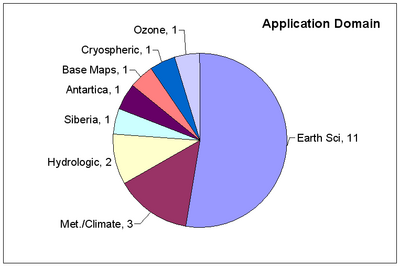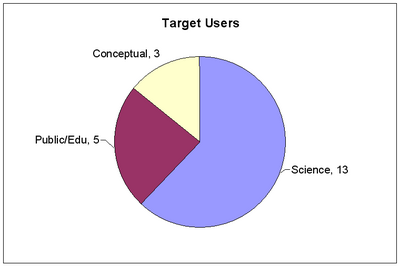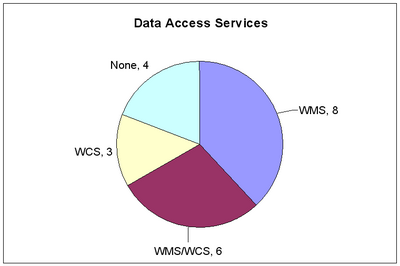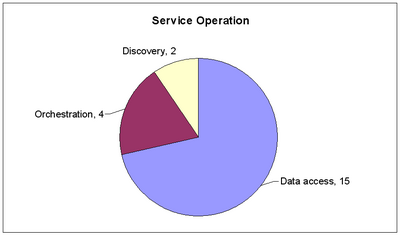Difference between revisions of "Content Analysis of Interoperability Abstracts"
| (3 intermediate revisions by 2 users not shown) | |||
| Line 1: | Line 1: | ||
| − | In preparation for the AGU session: "Interoperability..." we have performed a crude content analysis of submitted abstracts. It is not clear what purpose this | + | In preparation for the AGU session: "Interoperability..." we have performed a crude content analysis of submitted abstracts. It is not clear what purpose this exercise might have beyond informing the interested participants. The list of 21 analyzed abstracts mostly (18/21) includes contributions from the Earth Science Informatics domain. As seen below the classification of the contents is rather arbitrary. |
=== Application Areas=== | === Application Areas=== | ||
Half of the abstracts (11/21) are applicable to general Earth Science while the other half is devoted to applications that are targeted to either geographic (e.g. Antartica) or Earth Science subdomains (e.g. hydrology, ozone) | Half of the abstracts (11/21) are applicable to general Earth Science while the other half is devoted to applications that are targeted to either geographic (e.g. Antartica) or Earth Science subdomains (e.g. hydrology, ozone) | ||
| − | [[Image:ApplicationDomain.png|400px]] | + | [[Image:ApplicationDomain.png|400px]]<br> |
The target users for the information systems were mostly for scientists (13/21). There are also significant efforts (5/21) devoted to public/educational users. Three papers on interoperability were "conceptual", which makes them hard to classify. | The target users for the information systems were mostly for scientists (13/21). There are also significant efforts (5/21) devoted to public/educational users. Three papers on interoperability were "conceptual", which makes them hard to classify. | ||
| − | [[Image:TargetUsers.png|400px]] | + | [[Image:TargetUsers.png|400px]]<br> |
| + | |||
===Data Access Services=== | ===Data Access Services=== | ||
Of the 21 abstracts, 13 indicated the use of ''WMS'' and 9 indicated the use of ''WCS'' Standards. Six of the abstracts referrerd to both WMS and WCS. | Of the 21 abstracts, 13 indicated the use of ''WMS'' and 9 indicated the use of ''WCS'' Standards. Six of the abstracts referrerd to both WMS and WCS. | ||
| Line 14: | Line 15: | ||
Four contributions are devoted to data processing services and the ''orchestration'' of service chains. Two papers deal with data/service ''discovery''. | Four contributions are devoted to data processing services and the ''orchestration'' of service chains. Two papers deal with data/service ''discovery''. | ||
| − | [[Image:ServiceOperation.png|400px]] | + | [[Image:ServiceOperation.png|400px]]<br> |
Nine contributions refer to interoperable information systems that include end user tools such as data browsers. | Nine contributions refer to interoperable information systems that include end user tools such as data browsers. | ||
| + | |||
| + | [[Category:Interoperability]] | ||
Latest revision as of 12:58, November 28, 2008
In preparation for the AGU session: "Interoperability..." we have performed a crude content analysis of submitted abstracts. It is not clear what purpose this exercise might have beyond informing the interested participants. The list of 21 analyzed abstracts mostly (18/21) includes contributions from the Earth Science Informatics domain. As seen below the classification of the contents is rather arbitrary.
Application Areas
Half of the abstracts (11/21) are applicable to general Earth Science while the other half is devoted to applications that are targeted to either geographic (e.g. Antartica) or Earth Science subdomains (e.g. hydrology, ozone)

The target users for the information systems were mostly for scientists (13/21). There are also significant efforts (5/21) devoted to public/educational users. Three papers on interoperability were "conceptual", which makes them hard to classify.

Data Access Services
Of the 21 abstracts, 13 indicated the use of WMS and 9 indicated the use of WCS Standards. Six of the abstracts referrerd to both WMS and WCS.
In 15 of the abstracts interoperability pertains to interoperability of data access services using the above standards.

Data Processing and Discovery Services
Four contributions are devoted to data processing services and the orchestration of service chains. Two papers deal with data/service discovery.

Nine contributions refer to interoperable information systems that include end user tools such as data browsers.